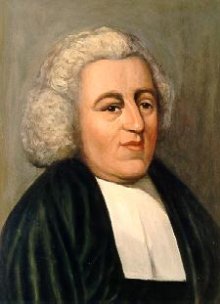John Newton
Anglican clergyman, slave trader and abolitionist (1725–1807)
John Henry Newton, Jr. (July 24, 1725 – December 21, 1807) was a slave ship captain who became an Anglican clergyman.[2] He was the author of many hymns, including "Amazing Grace". This hymn talks about the Divine grace which reached out to a "wretch" (evil person) like himself. After he was saved from his sinful life he worked hard to stop the transportation of slaves on English ships. He worked with the member of parliament, William Wilberforce. The slave trade was outlawed in 1807 in England and other countries soon did the same. [3] This law was passed just 9 months before Newton's death.
John Newton | |
|---|---|
 Contemporary portrait of Newton | |
| Personal details | |
| Born | 4 August [O.S. 24 July] 1725[1] Wapping, London, Great Britain |
| Died | 21 December 1807 (aged 82) London, United Kingdom |
| Spouse |
Mary Catlett
(m. 1750; died 1790) |
| Occupation | British sailor, slaver, Anglican clergyman and prominent slavery abolitionist |
References
change- ↑ Hatfield 1884.
- ↑ Dunn, John (1994). A Biography of John Newton (PDF). New Creation Teaching Ministry. Archived from the original (PDF) on 2021-03-22. Retrieved 2020-11-11.
- ↑ 1807 – The Abolition of Slavery The abolition of the slave trade – Chasing Freedom: The Royal Navy and the suppression of the transatlantic slave trade Royal Naval Museum, Portsmouth Historic Dockyard history.ac.uk, accessed 30 August 2019
Other websites
change- Famous Quotes by John Newton Archived 2020-05-14 at the Wayback Machine
- Amazing Grace: The True Story Archived 2009-04-10 at the Wayback Machine
- Amazing Grace: John Newton information
Wikiquote has a collection of quotations related to: John Newton